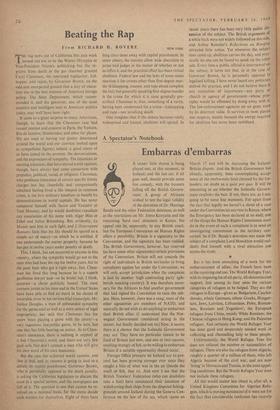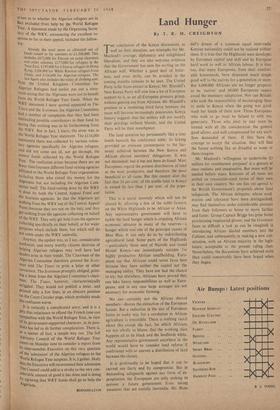A Spectator's Notebook
Embarras d'embarras
A MLRRY little drama is being played out, at this moment, in Iceland; and the last act, if all goes well, should provide some fine comedy, with the trousers falling off the British Govern- ment. A group of Africans wished to test the legal validity of the detention of Dr. Hastings Banda and the other Federation detainees, as well as the restrictions on Mr. Jomo Kenyatta and the remaining 'hard core' detainees in Kenya. No appeal can lie, apparently, to any British court, but the European Convention on Human Rights offers a possibility. Britain is a signatory to the Convention, and the signature has been ratified. The British Government, however, has reserved (as have some other signatories) certain provisions of the Convention. Britain will not concede the right of individuals in British territories to bring complaints against her under the Convention; we will only accept jurisdiction when the complaint is laid by another 'high contracting party' (gib- berish meaning country). It was therefore neces- sary for the Africans to find another government that had signed the Convention to raise the sub- ject. Here, however, there was a snag; most of the other signatories are members of NATO, and naturally do not wish to do anything to embarrass their British allies. (I understand that the Nor- wegian Government considered acting in the matter, but finally decided not to.) Now, it seems, there is a chance that the Icelandic Government may act. They have no particular reason to be fond of Britain just now, and one or two reasons, smelling strongly of fish, to be willing to embarrass Britain if a suitable opportunity should occur.
Foreign Office pressure on Iceland not to pro- ceed has been growing stronger ever since they caught a hint of what was in the air (beside the smell of fish, that is). And now I see that the British Trawlers' Federation (who can doubtless take a hint) have announced their intention of withdrawing their ships from the disputed fishing- grounds around Iceland during the Geneva Con- ference on the law of the sea, which opens on March 17 and will be discussing the Iceland- Britain dispute. And the British Government has already, apparently, been contemplating accep- tance of the twelve-mile limit claimed by the Ice- landers, no doubt as a quid pro quo. It will be interesting to see whether the Icelandic Govern- ment swallows the bait. If not, there are, as I say, going to be some fine moments. For apart from the fact that legally we haven't a shred of a case under the Convention (at any rate in Kenya, where the Emergency has been declared at an end), one of the things the Human Rights Commission must do in the event of such a complaint is to send an investigating commission to the territory con- cerned. So if Dr. Banda's detention was made the subject of a complaint Lord Monckton would sud- denly find himself with a rival attraction just across the street.
But it has been something of a week for the embarrassment of allies; the French have been at the receiving end too. The World Refugee Year, with its imposing list of all-party, all-denomination support, lists among its four aims the various categories of refugees to be helped. They are the refugees in Europe—given as 'Bulgarians, Czecho- slovaks, ethnic Germans, ethnic Greeks, Hungar- ians, Jews, Latvians, Lithuanians, Poles, Ruman- ians, Russians and Yugoslavs'; the European refugees from China, mainly White Russians; the Chinese refugees in Hong Kong; and the Palestine refugees. And certainly the World Refugee Year has done good and desperately needed work in collecting and channelling help to these people.
Unfortunately, the World Refugee Year list does not exhaust the number or nationalities of refugees. There are also the refugees from Algeria, roughly a quarter of a million of them, who left Algeria because of the civil war, and are now 'living' in Morocco and Tunisia, in the most appal- ling conditions. But the World Refugee Year does not include these refugees.
All this would matter less (there is, after all, a United Kingdom Committee for Algerian Refu- gees, which is moving mountains) if it were not for the fact that considerable confusion has recently
arisen as to whether the Algerian refugees are in fact excluded from help by the World Refugee Year. A statement made by the Organising Secre- tary of the WRY, announcing the excellent re- sPcmse so far to their appeal, included the follow- ing:
Already the total spent or allocated out of funds 'raised so far amounts to £1.500,000. This includes £673,000 for Europe on camp clearance and other schemes. £177,000 for refugees in the Near East. £195.000 for Chinese refugees in Hong Kong. £104.000 for White Russian refugees from China, and £116,000 for Algerian refugees. The last figure also includes the value of clothing sent. No the United Kingdom Committee for
Algerian Refugees had earlier put out a state- ment saying that the Algerians were not to benefit from the World Refugee Year funds. When the WRY statement 1 have quoted appeared in The 7 tmes and the Scotsman, the Algerian Committee had a number of complaints that they had been misleading possible contributors to their fund by saYing that nothing was to be forthcoming from the WRY. But in fact, I learn, the error was in the World Refugee Year statement. The £116,000 mentioned there was collected by various volun- tary agencies specifically for Algerian refugees, and did not come out of, nor go through, the central funds collected by the World Refugee Year The confusion arises because there are no fewer than fourteen different fund-raising agencies affiliated to the World Refugee Year organisation, including those who raised the money for the Algerians, but not including the Algerian Com- mittee itself. The fund-raising done by the WRY is done by both the Central Appeal Fund and the fourteen agencies. So that the Algerians get nothing from the WRY out of the Central Appeal Fund (because they are not on the list); and they get nothing from the agencies collecting on behalf Of the WRY. They only get help from the agencies collecting specifically on their behalf, or for wider Purposes which include them, but which still do not come under the WRY umbrella.
Anyway, the upshot was, as I say, considerable confusion, and many worthy citizens desirous of helping Algerian refugees may well have had doubts arise in their minds. The Chairman of the Algerian Committee therefore pressed the Scots- "Ion and The Times to print a letter or other correction. The Scotsman promptly obliged, print- ing a letter from the Algerian Committee's chair- man. The Tittles, however, characteristically wriggled. They would not publish a letter, and printed only a few lines, in an obscure position Ott the Court Circular page, which probably made the confusion worse.
It is certainly a complicated story, and it is a Pity that reluctance to offend the French (one can sYmPathise with the World Refugee Year, in view of its government-supported character, in its posi- tion) has led to its further complication. There is. as a matter of fact, a simple way out. The full Advisory Council of the World Refugee Year Meets on Monday next to consider a report from its nine-member Executive on this very question of the 'admission' of the Algerian refugees to the World Refugee Year auspices. It is, I gather, likely that the Executive will recommend their admission The Council could add at a stroke to the very con- siderable amount of good it has done and is doing
by agreeing that WRY funds shall go to help the Algerians.
BERNARD LEVIN



































 Previous page
Previous page